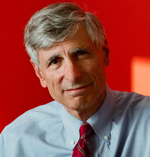January 6, 2012 - By Ruthann Richter

Philip Pizzo
Philip Pizzo, MD, dean of the Stanford School of Medicine, is the 2012 recipient of the John Howland Medal — the highest honor bestowed by the American Pediatric Society and considered the most coveted award in pediatric academic medicine.
The medal honors Pizzo for a lifetime of achievement, spanning his four decades in research and care for children with cancer, AIDS and other infectious diseases, as well as his leadership and advocacy in pediatrics and academic medicine.
“The committee believed that Dr. Pizzo was the perfect candidate because of his long-standing leadership in research and in HIV clinical trials, as well as his general leadership in both research and advocacy for pediatrics,” said Bruder Stapleton, MD, president of the society and chair of pediatrics at the University of Washington.
He said Pizzo is credited with leading the initiative in the late 1990s to secure federal funding for resident training in children’s hospitals — roughly $300 million a year that supports charity care for children, as well as training the pediatric workforce.
“The committee also felt that Dr. Pizzo was such an outstanding, visible role model that it would inspire the membership,” Stapleton said of the award, which was announced today. “His recognition would be very positive for the whole field of pediatrics.”
Pizzo, the Carl and Elizabeth Naumann Professor of Pediatrics and of Microbiology and Immunology at the medical school, said he was “deeply honored and humbled” to receive the medal.
“I have been privileged to be part of science and medicine for the past decades, during which I have witnessed firsthand the dramatic changes that basic and clinical research have played in improving human life,” he said. “I have particularly valued whatever personal contributions I have been able to make on behalf of children and families facing the challenge of major illness. It is indeed a privilege to be honored for doing something that I have cared about so passionately and deeply throughout my career.”
Pizzo will head to Boston April 29 to receive the award at the society’s annual meeting and to attend a dinner in his honor.
The son of Italian immigrants, Pizzo, 67, grew up in the Bronx and was the first member of his family to go to college. He attended Fordham University, graduating cum laude with studies in philosophy and biology. After receiving his MD degree with honors and distinction in research from the University of Rochester in 1970, he went to the National Cancer Institute, where he spent the next 23 years as head of the infectious disease section, chief of the pediatric department and acting scientific director of the Division of Clinical Sciences. AIDS was just entering the national consciousness then, and Pizzo would find himself on the ground floor of developing new approaches to treating and preventing the disease in children.
He has effectively advocated before Congress on behalf of children and children’s research, and contributed findings in oncology and infectious disease to more than 500 scientific articles and 16 books and monographs.
Pizzo came to Stanford as dean in April 2001 after serving as physician-in-chief of Children’s Hospital in Boston and as chair of the Department of Pediatrics at Harvard Medical School from 1996 to 2001. At Stanford, he has led multiple initiatives that have transformed clinical, research and educational programs, as well as the school’s physical landscape. He was instrumental in building the Li Ka Shing Center for Learning and Knowledge, the school’s distinctive new home.
Established in 1952, the medal is named for John Howland, MD, an outstanding clinician-scientist who led the first full-time academic pediatrics department at Johns Hopkins Hospital. It is awarded annually to luminaries in the field of pediatrics — those who have distinguished themselves as scientists, leaders and teachers. This is the second time a Stanford faculty member has been honored with the medal; the first was Harold Faber, MD, who received the medal in 1956.
Winners are chosen through a rigorous process, with nominees submitted by colleagues around the country. David Stevenson, MD, vice dean of the medical school and the Harold K. Faber Professor of Pediatrics, submitted Pizzo’s nomination, which was supported by letters from current and former deans, chairs and other distinguished pediatricians throughout the United States.
The award winner is selected by the society’s elected council, usually after several rounds of discussion, said Stevenson, a former president of the organization.
“Often people are on the list for a decade before they are chosen,” he said. “So it’s really an incredible feat to achieve that level of distinction.”
He said Pizzo seemed a natural for the award, given his dedication and effectiveness as an inspirational leader on all fronts — as a scholar, educator, advocate and dean. “His efforts, in my opinion, have transformed individuals, institutions and our broader society,” Stevenson said.
Pizzo has received many other awards, including the Outstanding Service Medal from the U.S. Public Health Service (1995), the Barbara Bohen Pfiefer Award for Scientific Excellence (1991), the Elizabeth Kubler-Ross Award (2008) and the Ronald McDonald Charities Award of Excellence (2009). He was the first person named to the Independent Citizens’ Oversight Committee of the California Institute for Regenerative Medicine, and is a member of the Institute of Medicine, where he served as chair of its Health Science Policy Board and is an elected member of the IOM Council, among other activities.
Pizzo is well-known to many on the Stanford campus for his early morning runs, in which he logs 50 to 70 miles a week and a regular schedule of marathons.
About Stanford Medicine
Stanford Medicine is an integrated academic health system comprising the Stanford School of Medicine and adult and pediatric health care delivery systems. Together, they harness the full potential of biomedicine through collaborative research, education and clinical care for patients. For more information, please visit med.stanford.edu.